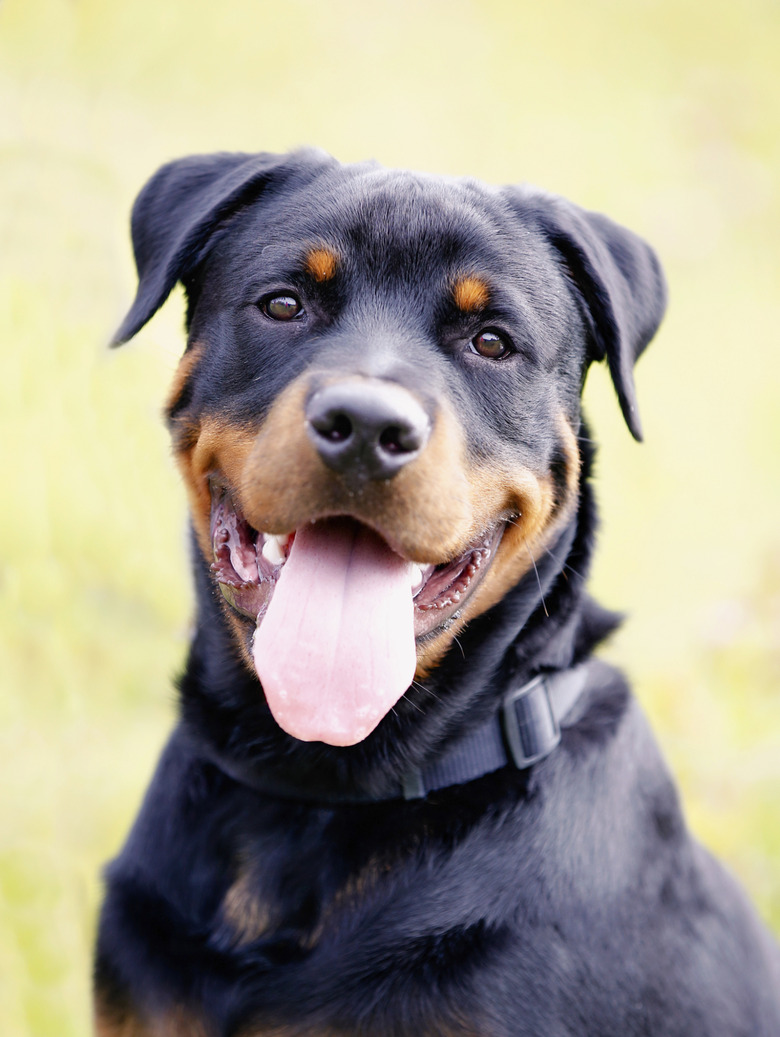Skin Problems In Rottweilers
Lick, lick, lick. Scratch, scratch, scratch. Your Rottweiler may be a big strapping dog, but he's not made of stone. If he has a skin problem, it may be driving you both crazy. Rottweilers are vulnerable to a variety of medical conditions, but generally, skin problems aren't at the top of the list of ailments common to them.
Infection in the Hair Follicles
Infection in the Hair Follicles
The one skin condition your Rottweiler may be more vulnerable to than some other breeds is folliculitis, an infection in his hair follicles. If he has a mild case, you'll see many little pustules, usually in his armpits, groin and abdomen, each with a hair popping out of the center. The follicles also may have scaly rings around them. As the infection progresses, it can go deeper into the skin, forming large pustules and boils that rupture, ooze pus and crust over. Folliculitis often happens as a result of other skin issues, such as scabies, so it's vital to treat the underlying cause for a permanent solution. If your pup has this condition, he'll likely need twice-daily bathing with special shampoo and antibiotics.
Hot Spots
Hot Spots
Perhaps your Rottweiler had a tiny insect bite he couldn't stop worrying about, eventually licking it until it became raw. That's a hot spot and anything that irritates his skin, making him scratch or lick himself, can initiate it. Also known as acute moist dermatitis, hot spots are painful, red and moist, and grow very quickly. Some dogs will develop them as they lick themselves out of stress or boredom. Your vet will try to figure out what caused the hot spot — such as a bug bite or an anal gland infection — and address the root cause. Other care includes cleansing the wound and medication such as pain killers, antibiotics and corticosteroids to help control the itching.
Allergic Reaction
Allergic Reaction
Like every other dog, a Rottweiler is susceptible to allergies. An allergy is a reaction to an environmental irritant. Skin allergies are increasingly common in dogs — the most common reason for a vet visit by dog owners, according to Veterinary Pet Insurance. A dog can suffer from contact allergies, from an irritant that's directly contacted his skin; food allergies, caused by food or drugs; flea allergy dermatitis, caused by fleas or other insects that bite; and canine atopy, caused by an inhaled allergen, such as mold, pollen or dust mites. In some cases, such as after a vaccination or a bug bite, a dog may develop a sudden case of hives, which tend to disappear within 24 hours. Other times, your dog may seem to scratch endlessly, as he would if he suffered from a flea allergy. Treatment depends on the allergen, ranging from diet modification to medication, but in all cases, you'll want to limit — if not erase — any exposure your pup has to the allergen.
More Than Skin Deep
More Than Skin Deep
Most of the Rottweiler's health issues tend to be on the inside. Heart conditions, such as subaortic stenosis, epilepsy, cancer, hypothyroidism, Addison's disease and progressive retinal atrophy are all diseases the breed is prone to developing. As well, the Rottweiler is one of the breeds most impacted by hip dysplasia. He's also especially vulnerable to gastric torsion, caused by the stomach filling with gas and twisting on itself. To keep your Rottweiler at his best, feed him a healthy diet, provide him ample exercise and make sure he gets regular veterinary exams.
Always check with your veterinarian before changing your pet's diet, medication, or physical activity routines. This information is not a substitute for a vet's opinion.
